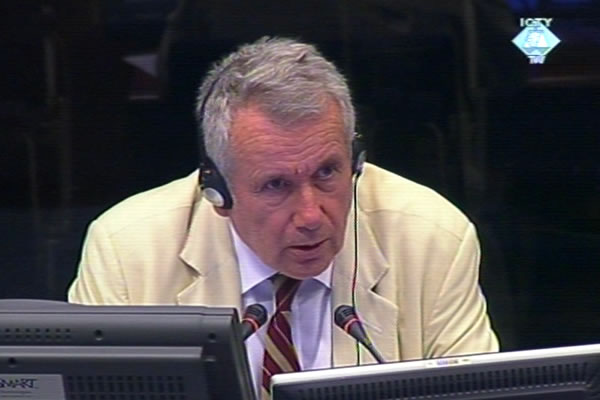Home
CITIZENS OF SARAJEVO ‘TRAPPED BY WAR’
At the trial of Radovan Karadzic, British journalist Martin Bell testified about the civilian suffering and casualties in besieged Sarajevo. Bell reported from Sarajevo during the entire war, with short breaks. Unlike him and other war reporters who would ‘arrive in Sarajevo and then leave’, the people of Sarajevo lived there all the time, ‘trapped by war without an end in sight’, Bell said
 Martin Bell, witness at the Radovan Karadzic trial
Martin Bell, witness at the Radovan Karadzic trial ‘It was the first time in the history of warfare that weapons of mass destruction were used, and we journalists had the mass communication equipment to report this on a daily basis. In that respect, we were simultaneously participants and witnesses’, said BBC’s war reporter Martin Bell at the trial of former Republika Srpska president Radovan Karadzic, for genocide and other crimes in the war in BH.
According to the British journalist, it was not that the civilians in Sarajevo were caught in the ‘cross-fire’: they were ‘deliberately targeted from both sides of the front line’. Bell said he had never seen so much anxiety and fear etched on human faces: some of the faces were ‘gray with fear’. ‘It was easy for us: we came and stayed for a few weeks while they were there all the time, trapped by war without an end in sight’, the witness recounted.
Prosecutor Edgerton today played excerpts from Bell’s war reports. In his comments, Bell said that after all those years he found it hard to watch once again the scenes of the suffering of the people from Sarajevo. Because of his reports and footage from Sarajevo, Bell was called by some British politicians the founding member of the “Something has to be done” club, an advocate of foreign military intervention to stop the mounting civilian casualties. Bell noted that ‘Western democracies didn’t care about those people; those countries didn’t understand that everybody was threatened by the fire that burned in a part of our common European home’.
In his cross-examination, Karadzic responded to those videos with his own selection of war stories describing the attacks by the Territorial Defense on Serb positions in Ilidza and on the JNA 2nd Military District HQ in Sarajevo. Karadzic’s choice of reports contained quotes from his peaceful public appearances and his interviews with foreign journalists, in which he spoke of ‘closing down the POW camps’ and ‘refugee centers’, the terms he used for the prison camps in Manjaca and Trnopolje. Karadzic also promised those who perpetrated crimes against Croats and Muslims would be prosecuted, ‘if there is evidence’.
In an attempt to shift the blame for the war on the other side, Karadzic said that Alija Izetbegovic issued a directive on 12 April to attack the JNA ‘despite the Skopje agreement’ allowing a peaceful withdrawal of the Yugoslav army.
Karadzic noted that the people in Muslim and Croat villages who voluntarily surrendered their arms were guaranteed ‘full freedom and safety’. Karadzic listed several villages on Mount Romanija, near Han Pijesak and Rogatica that in his view ‘remained safe until the end of the war’. ‘I am glad to hear it,’ Bell replied, saying he regretted that was not the case in some other places, like Foca. ‘Perhaps you encountered some resistance in Foca, I assume’, Bell remarked cynically.
Karadzic will continue his cross-examination of the British journalist tomorrow.
Linked Reports
- Case : Karadzic
- 2010-12-13 LAST STROLL TO MARKALE
- 2010-12-10 KARADZIC: STARI GRAD MUNICIPALITY WAS ‘TORTURE CHAMBER FOR SERBS’
- 2010-12-09 KARADZIC REFUSES TO BUDGE ON CLAIMS ABOUT ‘STAGED’ MASSACRES
- 2010-12-15 WHO DENIGRATED RADOVAN KARADZIC
- 2010-12-16 KARADZIC NOT CONVINCED ABOUT AUTHENTICITY OF PROSTHETIC LIMB FROM MARKALE
- 2011-01-12 KARADZIC’S MOTION DISMISSED
